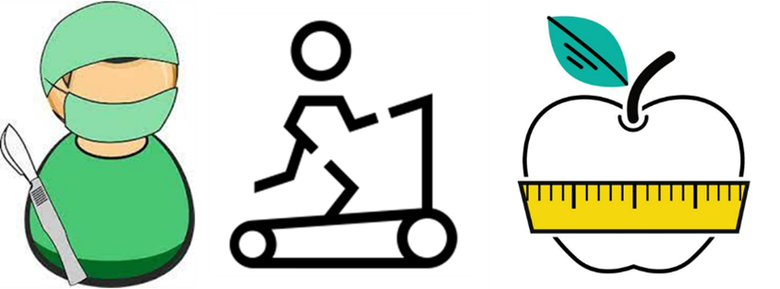
What is the problem?
Severe obesity can be described as having a body mass index (BMI) of 35kg/m2 or above. People with severe obesity have an increased risk of type 2 diabetes, heart disease, stroke, and some cancers. This shortens people’s life span and reduces quality of life. Treating obesity related disease is expensive. NHS Scotland spends between £363 and £600 million per year treating obesity related disease. Total economic costs are even higher. When we add in non-health costs, such as time off work, lost school days or social welfare support, costs increase to £4.6bn per year in Scotland. Our paper looked at which treatment option provides the best value for money to the NHS in treating adults with severe obesity.
What do we know?
Obesity guidelines make recommendations about which treatment to offer on the NHS [NICE]. However, there is no research that compares the cost-effectiveness of all available treatment options against each other to find out which treatment offers the best value for money.
How can we find out more?
To judge which treatment is ‘best’, we used an economic evaluation. This is because an economic evaluation can compare NHS costs and benefits of different healthcare services. Costs included the treatment itself, long-term NHS costs from treating obesity related diseases and cost savings from avoiding those diseases because of weight loss. Benefits were measured using Quality Adjusted Life Years (QALYs) which is a single value that measures both patient’s life span and quality of life.
Our findings
We compared different weight management programmes, bariatric surgery or not helping. These treatment options were identified through a literature search for existing trials. The trials looked at how much a new treatment reduces weight or BMI compared to no treatment.
To understand the impact of weight loss on obesity related disease, we used an economic evaluation model. The model counted the number of disease events, the impact on costs, and quality of life. We combined all of this information together to calculate cost-effectiveness.
We found that bariatric surgery was the most expensive treatment. However, it produced the best improvement in QALYs and provided the best value for money overall. This is because patients lost the most weight, kept that weight off, and had fewer obesity related diseases.
However, not all patients with severe obesity may want to have surgery. In that case, the best value for money treatment was a low intensity weight management programme. This was a behavioural programme delivered over about 12 weeks, with advice on diet and physical activity.
For more details see:
Boyers, D., Retat, L., Jacobsen, E., Avenell, A., Aveyard, P., Corbould, E., Jaccard, A., Cooper, D., Robertson, C., Aceves-Martins, M., Xu, B., Skea, Z., de Bruin, M. and the REBALANCE team (2021) 'Cost-effectiveness of bariatric surgery and non-surgical weight management programmes for adults with severe obesity: a decision analysis model', International Journal of Obesity.
Avenell, A., Robertson, C., Skea, Z., Jacobsen, E., Boyers, D., Cooper, D., Aceves-Martins, M., Retat, L., Fraser, C., Aveyard, P., Stewart, F., MacLennan, G., Webber, L., Corbould, E., Xu, B., Jaccard, A., Boyle, B., Duncan, E., Shimonovich, M. and Bruin, M. (2018) 'Bariatric surgery, lifestyle interventions and orlistat for severe obesity: the REBALANCE mixed-methods systematic review and economic evaluation', Health Technology Assessment, 22(68).
We also published a blog post in 2020 on the REBALANCE project. The project was a systematic review of existing cost-effectiveness studies evaluating bariatric surgery, lifestyle interventions and orlistat for people with severe obesity.
Thanks to Elisabet Jacobsen and Dwayne Boyers of HERU for their work developing this blog post.
The REBALANCE: REview of Behaviour And Lifestyle interventions for severe obesity: AN evidenCE synthesis study was funded by the National Institute for Health Research Health Technology Assessment Programme (Project Number: 15/09/04). The views and opinions expressed herein are those of the authors and do not necessarily reflect those of the HTA programme, NIHR, NHS, or the Department of Health.
HERU is supported by the Chief Scientist Office (CSO) of the Scottish Government Health and Social Care Directorates (SGHSC). The views expressed here are those of the Unit and not necessarily those of the CSO.


